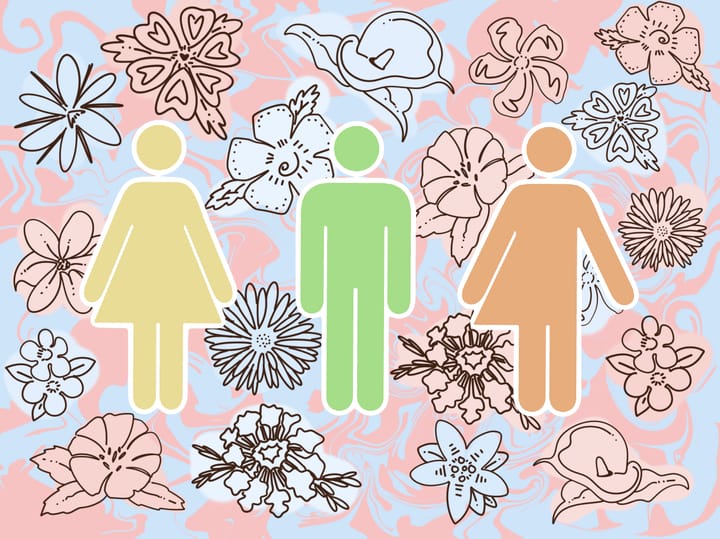The Naked Truth: Complexities of Unwanted Sex in Hookups

The author of this article extends a trigger warning, as they discuss topics that may be disturbing to some, including unwanted sex and rape.
Both women and men view unwanted sex as a tradeoff to preserve their safety and social standing.
Women grow up being told that sex is centered around men’s pleasure and that women must satisfy men when men are sexually aroused; however, men grow up being told that they must want sex and must take advantage of every sexual opportunity. Both women and men navigate the reputational consequences of saying no to a sexual experience.
Unwanted sex is a type of sexual encounter that, in the moment, feels obligatory and not completely consensual to either participant. While unwanted sex surely happens in committed relationships, sociologist Chiara Elena Cooper found in her 2023 study “Heterosex on Campus: Laced with Double-Binds” that — for white, middle-class, heterosexual, female college students — it happens more often in casual sexual encounters.
Women frequently don’t know how to define unwanted sex, so many don’t know if they’ve even experienced it.
“Unwanted sex was endured, normalized, and commonplace, but the women I met never considered it sexual assault or rape,” Cooper wrote. “Instead, it existed for them in a blurry, in-between, or liminal place that was unpleasant and awkward — something they vowed would never happen again.”
The college students in Cooper’s study continually weighed the consequences of participating or not participating in unwanted sex; women can either choose to participate and be labeled a “slut,” or women can choose to say no, risking a violent response or being labeled a “prude.” All of these consequences force women to gauge both her own and her partner's emotions during a sexual encounter, an act called emotional labor.
Women navigate the reality that they must perform emotional labor — or manage their partner’s feelings in addition to their own — during a sexual encounter. A woman does this by determining her own comfort level in a sexual situation while simultaneously foreseeing what could happen next, all while redetermining if she wants to progress that much further. If she does not, she begins questioning herself, deciding how to and when it is appropriate for her to say no. This is usually the moment that women measure their consequences: Is it worth it to say no?
In Cooper’s study, women discussed ways to measure whether or not a man would get angry if they said no during a sexual encounter; essentially, they felt responsible for protecting a man’s emotions during a sexual encounter. Emotional labor helps protect women, but it comes at the cost of mental exhaustion.
On certain occasions, women feel as if saying no is not an option. One woman included in Cooper’s study explained how she once tried to cut off a sexual encounter, and the man blocked her exit, not letting her leave. Each subsequent stage of the sexual encounter makes it harder for a woman to feel comfortable saying no, especially when her social standing is on the line.
Another woman, Eva, included in Cooper’s study said it was difficult to find a good time to say no.
“‘I didn’t really wanna go home with him, but [then] I was like, “Oh, I am already here,” and I didn’t wanna seem rude,’” Eva said. “‘I didn’t wanna cause issues and make him upset that I was there already, and we were already making out, so I was like, “Whatever.”’”
Women will also comply with unwanted sexual encounters because they do not want to be labeled a “tease” or a “prude.” Simultaneously, women are faced with being labeled as “easy” or a “slut” if they do continue in the sexual encounter.
When discussing unwanted sex, it’s also important to note its context in rape culture. British journalist Laurie Penny discusses the norms of rape culture in her book titled “Sexual Revolution: Modern Fascism and the Feminist Fightback.”
“But rape culture isn’t just a culture where this [routine rape] happens – it’s a culture where this happens and it’s normal,” Penny wrote.
While unwanted sex is not classified as rape, rape culture aids in the persistence of unwanted sex for women by normalizing undesired sexual encounters.
Men also face consequences when determining whether or not they should have unwanted sex, largely because societal toxic masculinity penalizes men for not participating in sexual acts.
According to sociologists Michelle J. Cera, Jessie Ford and Paula England, authors of a 2017 study titled “Social pressure to appear masculine leads straight men to have unwanted sex,” society perceives straight men in a variety of ways: as individuals who always want to have sex, who are expected to have sex if it is offered to them, and who are at risk of being labelled “a pussy,” “a virgin” or “gay” if they do not want to have sex.
Men in Cera’s study felt pressure to continue participating in a sexual encounter regardless of their actual interest in its progression.
“These expectations and stigmas amount to a rigid definition of heterosexual masculinity that puts men in difficult situations when they don’t want sex,” Cera, Ford and England wrote. “Furthermore, due to social expectations around sex, men seem to have fewer acceptable pathways than women for saying ‘no.’”
Although the consequences of not participating loom, men’s wellbeing is also harmed when they do engage in sexual activity they don’t desire. Men weigh maintaining a masculine reputation against engaging in unwanted sexual encounters.
Unwanted sex definitely happens on college campuses. One study that focused on unwanted sex in small liberal arts colleges found that 23% of women and 7% of men surveyed had experienced some form of unwanted sex.
Unwanted sex is not a fun topic, but regardless of our comfort level discussing it, these experiences must somehow be addressed.
It is important that college students ensure ongoing consensual sexual experiences and know that either party has the power to stop at any point. College students must feel comfortable advocating for themselves in sexual situations by setting boundaries with their partners in order to prioritize safety and security.
If you or someone you know is battling sexual trauma, please reach out to on-campus resources. Augustana offers free counseling available on campus or via telehealth, private discussions with on-campus pastors and meetings with the campus mental health and wellness specialist.
We have more to come in two weeks when we discuss the presence of unwanted sex in committed relationships.
XOXO



